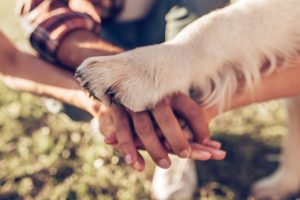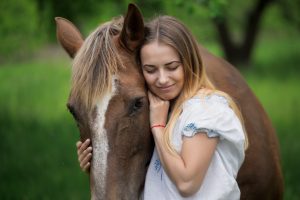In the area of grief and loss, anxiety, trauma, or in special needs, individuals are or can become more closed off from other human beings. Many are unable to express emotions properly, communicate with others, or feel independent to do things or interact with others. Individuals can become closed off to the world and unable to communicate with it. Counselors can utilize a variety of the therapies to help individuals cope better with emotions and also open back up with the world, but sometimes, especially in the case of those with mental defect, individuals need other ways to communicate and express emotion.

Animals and pets are an excellent source of love and way to heal. Animals can bring out the best in people and their presence can reduce stress and depression. Animals hence can play a key role in helping individuals who are grieving or dealing with anxiety.
Animal Therapy for Grief, Depression and Anxiety
Animal Therapy is broad spectrum approach to healing and helping those with autism express themselves, but also those who have experienced trauma, or even those who have anxiety or depression issues. Animals help individuals in a broad variety of ways to rediscover self, heal and move forward. While those who face life long mental issues can gradually improve through animal therapy, those with trauma or temporary issues can also benefit greatly with the company of an animal.
Animal Therapy has a long history, back to even Sigmund Freud, and with the advances of the its modern father, Boris Levinson. The idea of the comforting nature of an animal or pet and his/her presence has a calming effect on human beings. The company of animals can increase serotonin and dopamine, as well as lower cortisol levels by awakening the para sympathetic system. The presence releases tension and allows the person to find healing.
There is no limit to the types of animals that can be utilized. Horses, dogs, cats, rabbits, ferrets and other small mammals, birds, fish and even lizards can all be utilized. Different species have different end goals that can help individuals with particular needs. Dogs play a key role providing comfort and unconditional love, while cats help with individuals who are more awkward with initial touch and need. Horses and equine therapy play a large role in animal therapy and are provided at various locations for those who need to form better connections, trust, and responsibility. Even birds or fish can play a role in helping individuals find connection but also responsibility.
Benefits of Animal Therapy
Animal Therapy helps those with a wide variety of mental issues, but also those dealing with stress, anxiety, loss and depression. Physically, animal therapy, reduces stress and lowers blood pressure and increases dopamine and serotonin. It reduces cortisol and helps the person find comfort and calm. Emotionally, animal therapy, helps individuals find love and support. The unconditional love an animal can supply, or the fact, the animal needs the person, can help the individual feel love when sometimes love is absent in the person’s world.
Psychologically, animals help individual feel love and from that love individuals can find stronger self esteem to feel loved but also to express love to a fellow creature. The need and dependency of the animal upon the person helps build the person’s purpose. In addition, this purpose gives the person duty and responsibility. During therapy, the person is called to care for the animal, supply food and water, or provide basic care such as grooming or walking. Even the smallest duty of having to feed a fish and supplying a need to another creature can have huge therapeutic effects on the person. This sense of purpose also increases self esteem especially with the depressed.

In addition, training and teaching an animal helps individuals improve communication skills, social interaction, and independence to push forward in an endeavor or task. Individuals plagued with depression or other psychological maladies may be less receptive to enter the social arena of human interaction, but through animals, they can find it easier to communicate, wake up and do tasks, and exercise. This also increases one’s sense of trust between another being. Horse riding, or walking form bonds of trust which may be difficult with another person. This trust permits the person to feel more safe in social settings and to put oneself into the hands of another while also giving purpose to care for the other. Individuals experiencing loss may need to form new bonds and the bonds of love and trust and the social skills that are re-introduced through animals can be physically, emotionally and mentally rewarding.
Overall, animal therapy helps form new bonds, increases social interaction, improves communication skills, teaches trust and responsibility and reduces the physical manifestations of stress and anxiety. It gives the person purpose and responsibility again and helps the person re-enter the social world of other human beings or at least better skills to reintegrate oneself into society after trauma or loss, or if dealing with a mental issue. Animal Therapy can help with emotional release, talk therapy, and relief of various negative symptoms.
Obviously animal therapy is not for everyone. Some individuals may have issues that may endanger the animal, or others may be allergic to certain animals. Like all therapies, it depends upon the person but overall animal therapy is a very successful therapy when applied. One can find animal therapy through the referral of a therapist. Many are offered through campuses, hospitals and special programs at rehab centers or correctional facilities.
Conclusion
Animal Therapy can be supplemental with other therapies or a sole therapy. Ultimately, those with deeper issues such as Autism or permanent conditions can benefit greatly from animal therapy. Animals have the ability to help individuals form new bonds, express feelings and explore new skills necessary in social settings. Animals have the ability to bring out physical and emotional wellness by reducing stress and anxiety. Those who experience grief and loss can also form new bonds and find new purpose through animal care and the reciprocity of love that is shared between a person and animal. While animal therapy may not be the answer for everyone, it is highly successful for those suffering from various mental ailments and temporary issues with anxiety or depression.

Please also review AIHCP’s mental and behavioral health certifications, as well as in particular, it’s Grief Counseling Certification as well as its Stress Management Certification. The programs are online and independent study with mentorship as needed and is open to qualified professionals in the Healthcare, Human Service and Ministry fields. Please review and see if the programs meet your academic and professional goals.
Additional Resources
Baer, B. (2024). “Animal-assisted therapy (AAT) and emotional support animals”. Therapist.com. Access here
Jelinek, J. (2022). “All About Animal-Assisted Therapy”. PsychCentral. Access here
“Emotional Support/Therapy Animals”. (2017). Good Therapy. Access here
Olivine, A. (2024). “What Is Animal Therapy?” Very Well Health. Access here
“Animal-Assisted Therapy” (2022). Psychology Today Staff. Psychology Today. Access here
